
| 1900 > | 1910 > | 1920 > | 1930 > | 1940 > | 1950 > | 1960 > |
| 1970 > | 1980 > | 1990 > | 2000 > | 2010 > | 2020 > | 2030 > |
|
|
 |
||||||||||||||||
|
|||||||||||||||||
My time at Butzweilerhof - Colin Noad - Meine Zeit auf dem Butzweilerhof |
||||||||||||||||||||||||
 |
||||||||||||||||||||||||
| |
 |
|||||||||||||||||||||||
|
I
arrived at Butz in August 1958 where I stayed until February 1961
- a two and a half year tour of duty. I was a newly qualified MT Mechanic and I was posted to the station’s MT Servicing Section (MTSS). When I was there, the RAF didn't use the airfield any more. It was occupied by the Belgian Army Air Service. There were three major units there - FRU (Forward Repair Unit), 420 RSS (Repair and Salvage Section) and 5 Signals Wing |
Im
August 1958 traf ich auf dem Butz ein wo ich bis zum Februar 1961
blieb - Dienst über zweieinhalb Jahre. Nachdem ich gerade
meine Ausbildung als MT Mechanic absolviert und wurde
der
MT Servicing
Section (MTSS)
zugeteilt. Zu dieser Zeit nutze die RAF den Flugplatz nicht mehr . Der
Flugbetrieb wurde nur noch von der Belgien Army Service durchgeführt. Zu dieser Zeit waren drei große Einheiten auf dem Platz stationiert: FRU (Forward Repair Unit), 420 RSS (Repair and Salvage Section) und 5 Signals Wing |
|||||||||||||||||||||||
| This was situated just off the main square, opposite our Station Headquarters, which was the old Terminal Building of Cologne airport. |
|
Diese
Dienststelle lag, gegenüber unseres Hauptquartiers das im alten
Kölner Flughafengebäude untergebracht war, auf der anderen
Seite des Hauptplatzes.
|
||||||||||||||||||||||
|
We
also had a paint shop and I volunteered to work in there for a spell. I found the work both creative and enjoyable. Most of the vehicles were painted a rather boring overall green. My favourite vehicles were those of the Butz-based 6209 Bomb Disposal Flight. On these cars and lorries, we were actually allowed to paint vast areas (such as the wheel arches)in a bright, vivid, red! On top of that, there were large areas of white including the wording “Bomben Räum Kommando” that appeared in very large lettering, for obvious reasons. |
Wir
hatten auch eine Lackierwerkstatt in der ich für eine kurze
Zeit mithalf. Ich fand diese Arbeit sowohl kreativ als auch unterhaltsam.
Fast alle dieser Fahrzeuge waren in einem langweiligen Grün
lackiert. Meine Lieblingsfahrzeuge waren die Butz-stationierten
6209 Bomb Disposal Flight (RAF-Bezeichnung für eine kleine
Einheit). Auf diesen Fahrzeugen durften wir die großen Flächen,
wie zum Beispiel die Radkästen und Kotflügel, in eine
hellen freundlichen Rot bemalen. Auf diesen Flächen gab es,
aus nahe liegenden Gründen,
große weiße Flächen auf denen
in großen Buchstaben die Worte „Bomben-Räumkommando“ standen. |
|||||||||||||||||||||||
|
|
|||||||||||||||||||||||
|
|
|||||||||||||||||||||||
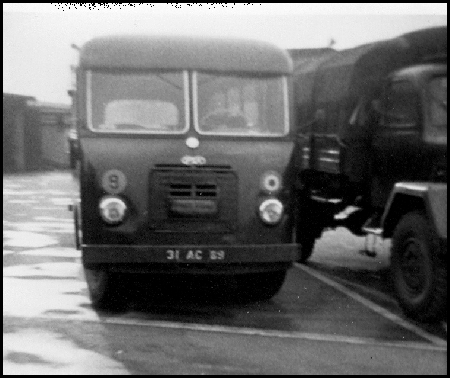 |
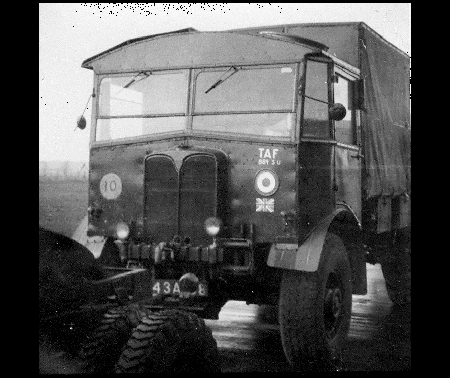 |
|||||||||||||||||||||||
Ford
Köln
coach |
AEC RVT |
|||||||||||||||||||||||
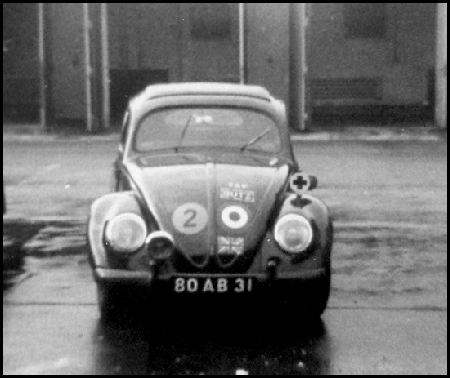 |
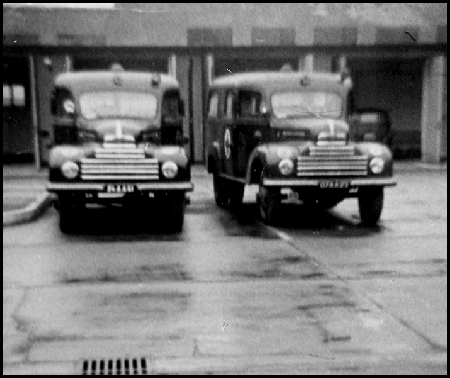 |
|||||||||||||||||||||||
Station
Medical Officer’s Volkswagen |
Ford
Köln
ambulance |
|||||||||||||||||||||||
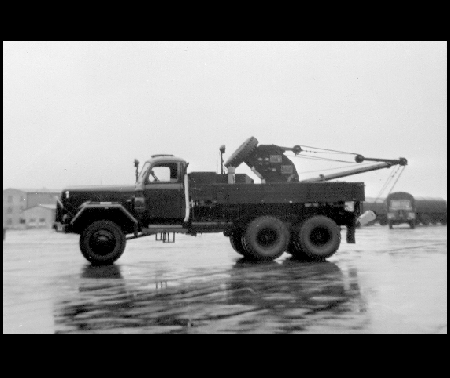 |
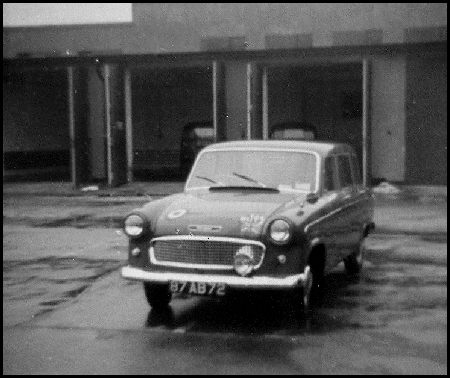 |
|||||||||||||||||||||||
Magirus
Uranus Wrecker |
Standard Ensign car. |
|||||||||||||||||||||||
|
Daily
life in MTSS On the main square, there were fifty or so Command Reserve Magirus lorries parked up.Our job was to service them and run themup regularly, just in case war ever broke out.I was never quite sure how this motley collection of vehicles would help us win the war, against the Eastern bloc’s tanks. But it wasn't up to me toquestion such matters. Mine not to reason why… The batteries were invariably flat when we went out to give them their monthly engine runs - we just had to hope that the Russians would give us sufficient notice of any attack for us to get them all running beforehand! |
Ein
normaler Tag im MTSS Auf dem Hauptplatz waren ca. 50 Command Reserve Magirus LKW geparkt. Unsere Aufgabe bestand darin, diese LKWs zu warten und in bestimmten Intervallen zu betreiben – nur für den Fall, dass jemals Krieg ausbrechen sollte. Ich war mir nie sicher, wie uns diese zusammen gewürfelte Kollektion helfen würde den Krieg gegen die Ostblock-Panzer zu gewinnen, aber das war nicht mein Problem. Die Batterien waren ausnahmslos schwach, wenn wir die Motoren zum monatlichen Check starteten – und so konnten wir nur hoffen, dass die Russen uns vor einem Angriff rechtzeitig informierten, damit wir ausreichend Zeit hätten um alle Motoren ans Laufen zu bringen. |
|||||||||||||||||||||||
|
All
of the other ranks of the MT section and of MTSS, lived in Portal block, close to the Astra Cinema and opposite the butcher’s and the PSI shop. At first I was in a room with five or six beds but I was lucky enough to eventually get a room that slept just two people! |
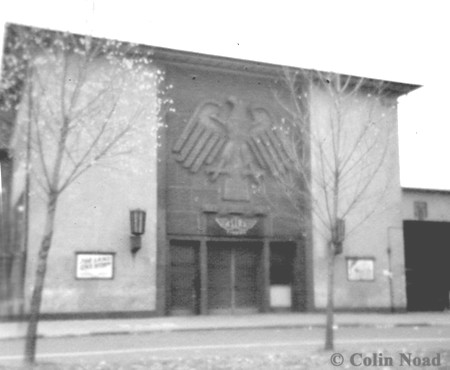 |
Alle
anderen Dienstgrade der MT und MTSS lebten im Portal-Block (Lord
Portal - Marshal of the Royal Air Force) in der Nähe des Astra-Kinos
(Empfangshalle des ehemaligen Flughafens), gegenüber der Metzgerei
und des PSI ("President of the Services Institute") Geschäfts. Anmerkung: PSI - ein Geschäft für allgemeiner Güter. Zuerst schlief ich in einem Raum mit fünf oder sechs Betten aber dann hatte ich das Glück ein Zimmer zu bekommen, in dem nur noch zwei Kameraden schliefen. |
||||||||||||||||||||||
ASTRA-Cinema Butzweilerhof |
||||||||||||||||||||||||
At
work, the RAF staff’s days consisted, mostly, of maintaining
the Command Reserve and other lorries (such as the wide spectrum of specialised radio vehicles). By contrast, the German civilian workers usually took care of cars and vans – mostly VW Beetles and Kombi’s. |
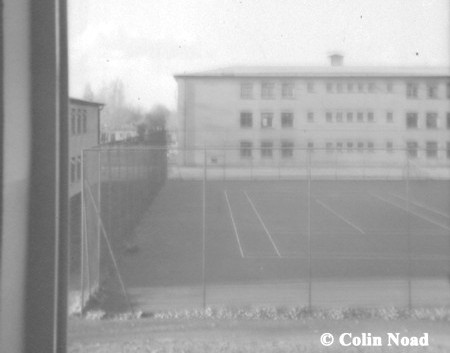 |
Die
Arbeit des RAF-Personals bestand meistens daraus, die Command Reserve
and
andere
LKWs (wie zum Beispiel das große Spektrum
von speziellen Funkwagen) zu warten. Im Gegensatz dazu versorgten die deutschen Zivilarbeiter normalerweise die PKWs und Transporter – meist VW Käfer und Kombis. |
||||||||||||||||||||||
Barrack block used by the, based, Forward
Repair Unit |
||||||||||||||||||||||||
|
The
GSO (German civilian staff) who worked with us in MTSS were a good
bunch and I got along well with most of them. The funniest things
was to see them playing cards in their lunch break! They were so
noisy!! Lots of shouting and banging down of cards.
I especially remember Otto Hollatz, with whom I often worked. We had a short, happy little man whom we called "Klein Kruschev" because he looked a little like the Russian leader. |
Die
GSO (Deutsche Zivilarbeiter) die mit uns im MTSS zusammen arbeiteten,
waren eine gute Gruppe und ich hatte eine nette Zusammenarbeit mit
Ihnen. Das lustigste war, wenn sie in der Pause zusammen Karten spielten.
Sie waren so laut! Mit lauten Rufen und dem lauten Ablegen der Karten. Besonders erinnere ich mich an Otto Hollartz mit dem ich oft zusammen gearbeitet habe. Außerdem hatten wir eine kleinen Mann den wir den "kleinen" Krutchow nannten, da er ein bißchen wie der Russische Führer aussah. |
|||||||||||||||||||||||
|
GSO Rudy (MT - the CO's driver) Franz (Supervisor, MT section) Fritz (Supervisor, MTSS) Herr Saeweco Civilian mechanics in MTSS “ Klein Kruschev” and Alfred, who both worked in the Paint Shop Ingo, Otto Hollatz and Manfred, who both taught me to swear in German Two Gastarbeiter (Manuel & Ramon?), who taught me to swear in Spanish! |
GSO Rudy (MT - the CO's driver) Franz (Supervisor, MT section) Fritz (Supervisor, MTSS) Herr Saeweco Civilian mechanics in MTSS “ Klein Kruschev” und Alfred, die beide in der Lackierwerkstatt arbeiteten. Ingo, Otto Hollatz and Manfred, die mir beibrachten in Deutsch zu schwören. Zwei Gastarbeiter (Manuel & Ramon?), die mir beibrachten in Spanisch zu schwören. |
|||||||||||||||||||||||
| RAF |
RAF |
|||||||||||||||||||||||
Chief Technicians Bloor and Bryant. |
Corporal =
Hauptgefreiter |
|||||||||||||||||||||||
|
It
wasn’t all very serious and cold-war like. For instance, the most important part of preparing for the AOC’s inspections (The inspection was an annual event and was always preceded by a lot of cleaning and tidying.), for us, was loading all of our ‘borrowed’ gear and bits that we had mossed away “in case they came in useful”, into a Magirus 3-tonner. Come the day of the inspection, that lorry found itself on special duties, off the Station. Once the inspection was over, the vehicle returned, was off-loaded, and we had all of our treasures back once more. I don´t remember any large exercises - only parades. I did attend the NATO 10th Anniversary parade, held on 4th April 1959 , in Mainz. Butzweilerhof supplied the 36-man RAF contingent and we stayed at a US Army camp located in Wiesbaden, whilst we were down there - we all thought that we had died and gone to heaven! We just didn't enjoy the luxury that they did, back at Butz. |
Es
war nicht alles ernst und „wie im Kalten Krieg“. Zum Beispiel war die wichtigste Maßnahme für die AOC’s inspections (Air Officer Commanding – eine jährliche Inspektion durch hohe Dienstgrade Basecommander usw. die vor allem mit sauber machen und aufräumen verbunden war. ), dass wir alle unsere „geborgten“ Getriebe und Werkzeuge die wir gebunkert haben – für den Fall, dass wir sie mal brauchen könnten – auf einen Magirus 3-Tonner. Am Tag der Inspektion, wurde der LKW auf eine „Spezialmission“ außerhalb der Station geschickt. Nach Ende der Inspektion kehrte der LKW dann zurück, wurde entladen und wir hatten unsere Schätze wieder zurück. An große Manöver kann ich mich nicht mehr erinnern - nur Paraden. Einmal nahm ich an der Feier zur 10. Gründung der NATO am 4. April 1965 in Mainz teil. Der Butzweilerhof stellte ein Kontingent von 36 Mann zur Verfügung, Wir übernachteten in einer US-Army Kaserne in Wiesbaden. Als wir dort waren dachten wir dass wir wären gestorben und im Himmel! Diesen Luxus hatten wir auf dem Butz leider nicht! |
|||||||||||||||||||||||
|
At
this time, the Belgian Army occupied the airfield on the flying side
of Butzweilerhof.
Approaching the camp on Butzweilerstrasse,
from Ossendorf, there was a level crossing, without barriers,
right on
a sharp bend. The road there was cobbled and got extremely slippery in rainy weather. We christened this “Belgique corner” as it was not at all unusual to see their private cars, or even their military lorries, in the field, where they ended up after missing the bend! Happily, there didn’t ever seem to be any injuries. Belgians did not have to pass any driving tests at that time. |
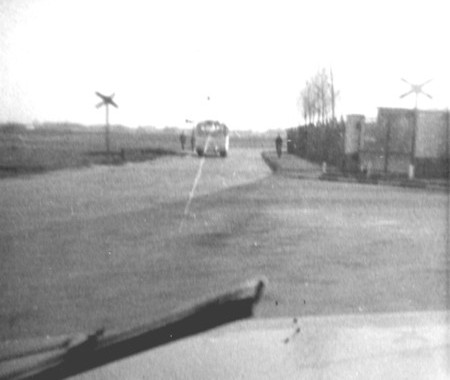 |
Zu
dieser Zeit belegte die Belgische Armee den Flugplatz in der Nähe der Rollbahn des Butzweilerhofs. Wenn man auf diese Kaserne über
die Butzweilerstraße von Ossendorf zufuhr, musste man einen Bahnübergang
ohne Schranken direkt hinter einer scharfen Kurve überqueren. Diese
Kopfsteinpflasterstraße war bei Regenwetter extrem rutschig. Wir
tauften Sie die „Belgische Kurve“, denn es war nichts ungewöhnliches
deren Privatautos oder sogar Militärlastwagen im Feld landen zu
sehen, nachdem sie die Biegung verfehlt hatten! Glücklicherweise ereigneten sich dort keine Verletzungen. In dieser Zeit mussten die Belgier keine Fahrprüfung ablegen….. |
||||||||||||||||||||||
|
Railway crossing on Butzweilerweg. This line led into the
RAF Station and was used for transporting goods in and out of the site.
A 28 bus can just be seen in the background. |
||||||||||||||||||||||||
There
was a very funny incident at the main gate
during one dark rainy night. |
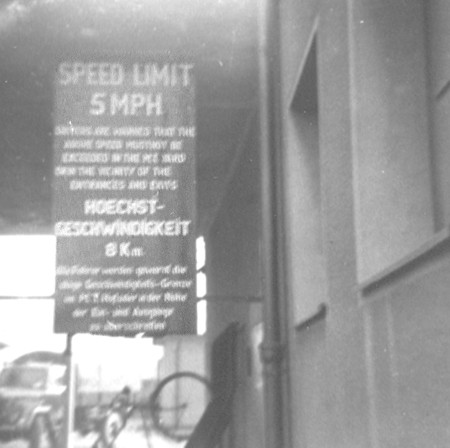 |
Am
Haupttor gab es in dieser Zeit während einer dunklen
regnerischen Nacht einen lustigen Zwischenfall. Es zeigte sich, dass
einer unserer besten RAF-Polizisten sich einen Spaß daraus
machte, die Schranke sofort zu schließen sobald ein Fahrzeug
passierte. Unglücklicherweise – alle
unsere Fahrzeuge waren dunkel grün lackiert - brachte er es fertig,
die Schranke genau zwischen Zugmaschine und Anhänger herunter zulassen.
Der Anhänger wurde nur leicht beschädigt, während die
Schranke sehr viel mehr ab bekam. Als wir die Geschichte am nächsten
Tag hörten,
tat es uns natürlich sehr leid – aber wir haben Tränen
gelacht. Das war ihm recht geschehen! |
||||||||||||||||||||||
Entrance to MT (Mechanical Transport) yard |
||||||||||||||||||||||||
|
The
films were all very current (all of the latest ones). We especially
enjoyed Tom & Jerry cartoons. |
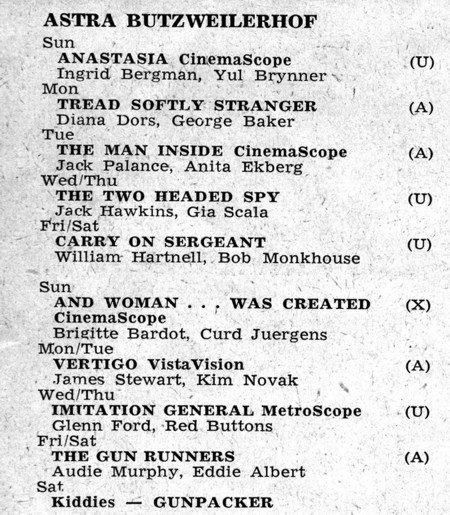 |
Bei
den Filmen handelte es sich um die aktuellen Filme. aber besonders
hatten wir Spaß an Tom & Jerry
Cartoons. |
||||||||||||||||||||||
Filmprogramm
des ASTRA-Cinemas auf dem Butzweilerhof |
||||||||||||||||||||||||
I
used to go to Cologne quite often. I enjoyed practicing my German.
I had
a favourite bar nearly opposite to what was then the main Police
Station. Probably all swept away after they built the Severinsbrücke
and started to redevelop the area. |
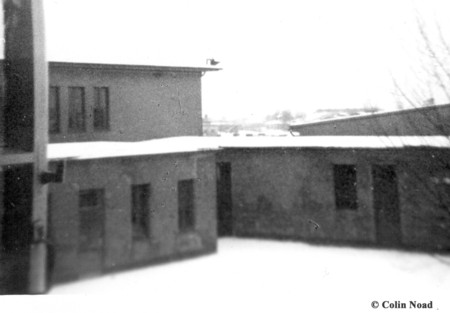 |
Ich
fuhr oft nach Köln. Dabei machte es mir Spaß mein Deutsch zu verbessern.
Ich hatte eine Lieblingsbar die gegenüber dem damaligen Polizeipräsidium
lag.
Wahrscheilich wurde alles abgerissen, als die Severinsbrücke
abgerissen wurde und das gesamte Areal umgestaltet wurde.
Ich hatte an Karneval kein Interesse und ich kann mich auch nicht daran erinnern jemals dorthin gegangen zu sein. |
||||||||||||||||||||||
|
Butzweilerhof im Winter |
||||||||||||||||||||||||
|
Apparently,
at that time at least, the civilian population preferred to have
family celebrations
at home. |
Aber
am Heiligen Abend ging ich in die Stadt weil ich dachte, dass dort
in den Bars eine gute Stimmung herrschen würde. Aber alles
war wie ausgestorben und überall war geschlossen. Offensichtlich zog
es die Bevölkerung vor zu Hause zu feiern. |
|||||||||||||||||||||||
|
We
went on some good trips, organised by the WVS ("Women's
Voluntary Service"). I remember going on outings to the Siebengebirge,
Brühl,
Königswinter (on a Rhine cruise boat), Ehrenbreitstein (Koblenz) and
Altenberg, where they had dancing fountains. We visited several Rhine
castles too. I also got to Wuppertal - I thought that their Schwebebahn
(monorail) was incredible and made clever use of the river to get through
the city centre! One time I went, with two good friends, to Nürburgring (that is the 'old' race track) to see a sports car championship - very exciting. |
Wir
hatten damals ein paar schöne Ausflüge, die vom WVS ("Women's
Voluntary Service") organisiert wurden. Ich erinnere mich daran, dass
wir Ausflüge ins Siebengebirge , Brühl, Königstein (auf
einem Rheinschiff), ehrenbreitstein (Koblenz) und Altenberg wo wir tanzende
Wasserfontainen gesehen
haben. Wir besuchten auch verschiedene Rheinburgen. Ich ging auch einmal
nach Wuppertal - ich dachte mir, dass deren Schwebebahn etwas unglaubliches
war und es eine gute Idee ist, den Fluss als Zugang zur Stadt zu benutzen. Einmal ging ich, mit zwei Freunden, zum Nürburgring um ein Autorennen zu sehen - es war sehr aufregend. |
|||||||||||||||||||||||
| Virtually all diesel vehicles in Germany at this time used an identical and very simple ignition key – it was simply a flanged shaft with a shaped top and a ball end. |
In
dieser Zeit nutzten alle Dieselfahrzeuge in Deutschland einen identischen und simplen Zündschlüssel – |
|||||||||||||||||||||||
|
If
stuck, a nail could be used as a substitute, however, not at night as the key flange was what operated the lights, when it was turned in the ignition – no key, no lights... |
dies
war eine angeflanschte Welle mit einer
scharfen Oberseite und einem runden Ende. Wenn er blockierte konnte
ein
Nagel helfen. Allerdings nicht Nachts, denn der obere Teil des Schlüssels
schal-tete die Beleuchtung ein, sobald die Zündung gestartet wurde – kein
Schlüssel, kein Licht….. |
|||||||||||||||||||||||
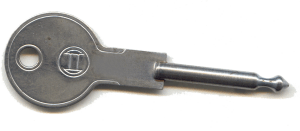 |
||||||||||||||||||||||||
| Imagine my surprise, when on a Rhine trip, to see that their hulking great ship also used exactly the same key! | Stellen
Sie sich meine Überraschung
vor, als ich während einer Rheintour sah, dass dort die gleichen Zündschüssel
benutzt wurden. |
|||||||||||||||||||||||
|
One
less funny thing that happened to me was when, one day, I needed to get up into the back of a Magirus lorry that was in one of our servicing bays. The usual way was to step up onto the towing hook, whilst grabbing the tailboard and haul yourself up and over! On this occasion some person (or persons) unknown had not secured the tailboard and so, when I was halfway up, it came down throwing me to the ground and breaking my arm! |
Eine "lustige" Sache
passierte mir eines Tages, als ich auf die Laderampe eines Magirus
LKWs
steige mußte, der in einer unserer Reparatur- buchten stand.Normalerweise stiegen wir auf den Abschlepphaken, hielten uns an der Ladeklappe fest und schwangen auf die Ladefläche. Dies wußten einige Leute nicht worauf die Laderampe nicht gesichert war worauf ich, als ich die halbe Strekce hinter mir hatte, die Ladrerampe herunter kam. auf den Boden geschleudert wurde und mir den Arm brach. |
|||||||||||||||||||||||
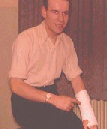 |
||||||||||||||||||||||||
I
managed to visit Cologne at the end of 2007. |
Ende 2007 besuchte
ich Köln noch einmal. Während der Vorbereitung fand
ich eine Reihe von Webseiten die |
|||||||||||||||||||||||
| |
||||||||||||||||||||||||
|
RAF Butzweilerhof in 1959 Written by Colin Noad
I arrived at RAF Butzweilerhof in August 1958. I was a newly qualified
MT Mechanic and I was posted to the station’s MT Servicing Section. This
was situated just off the main square, opposite Station Headquarters. I
did not then realise that the SHQ / Malcolm Club building was what had
once been Cologne Airport’s main Terminal Building. This building has
miraculously survived the war, despite the fact that “the Brits knew
where it was” – we should have, since Imperial Airways were operating
from there, prior to the war. Incidentally, this building has been
restored and it is one of the few remaining buildings on the site now,
in 2008. At the time of my arrival, I had never been abroad before and
did not even possess a passport – not that this was unusual in the
fifties. The first shock to the system came when we were being taken to
Butz. Nearly all of the vehicles had their headlights on, despite the
fact that it was not dark but just raining. Those were the days before
we adopted a similar system. At that time we didn’t tend to switch our
lights on in the UK until it was actually dark
The second shock to the system was, upon arriving at Butz, seeing the fifty or so Command Reserve vehicles parked on the square; these were our bread and butter, in MTSS, as we had to service them and run them up regularly, just in case the balloon ever went up. I was never quite sure how this motley collection of Magirus lorries would help us win the war, against the Eastern bloc’s tanks, but mine not to reason why… The batteries were invariably flat when we went out to give them their monthly engine runs - we just had to hope that the Russians would give us sufficient notice of any attack for us to get them all running beforehand! On camp you could have been at virtually any RAF station. However, at the time of my arrival, most of our RAF vehicles were of German manufacture. We were paid in BAF’s but we could pre-order Deutschmarks, for spending out of camp. Later, after the transition from 2 TAF to RAFG, we were paid entirely in DMs and had to request any sterling that we might need for returning to the UK on leave, etc. The Bundesbahn maintained a railway spur line into the Station and they used their locos and rolling stock to bring supplies in and out for us. BAOR knew our terminus as Köln 9 Depot – a rather grand description for what amounted to just an unloading platform and an engine shed. One could happily stay in camp and never venture out but I decided to learn German, helped by the fact that we had German engineers working in MTSS. Needless to say, I learned to swear fluently in German fairly quickly! Cologne was on our doorstep and so I had many opportunities to take myself off and talk to the natives. The WVS (as it then was, before becoming “Royal”) used to organise coach trips out and about, which enabled those of us without personal transport to see some of the sites. The ladies manning the WVS club (I remember one of them was called Audrey) were charming, friendly and helpful. The Malcolm Club introduced me to those heavenly amber liquids contained in the brown bottles of Der Rhein and green bottles of Die Mosel. Before arriving in Germany, I had never drunk wine (again, not so unusual in those days). All of the other ranks of the MT section and of MTSS, lived in Portal block, close to the Astra Cinema and opposite the butcher’s and the PSI shop. At work, the RAF staff’s days consisted, mostly, of maintaining the Command Reserve and other lorries (such as the wide spectrum of RVT, specialised radio vehicles). By contrast, the German civilian workers usually took care of cars and vans – mostly VW Beetles and Kombi’s. We also had a paint shop and there I found my own niche. I was a pretty average Mechanic – if a thread could be stripped, it was usually me who did it. However, when it came to spraying and brush painting, I was the man. I found it both creative and enjoyable. Most of the vehicles were painted a rather boring overall green. However, for the canvas tilts that covered the rear of our lorries, we used a foul-smelling greeny-brown bituminous gloop that resembled liquid pooh to smear over those. Not such an enjoyable job! My very favourite vehicles to paint were those of the Butz-based 6209 Bomb Disposal Flight. On the BD vehicles, we were actually allowed to paint vast areas (such as the wheel arches) in a bright, vivid, red! On top of that, there were large areas of white including the wording “Bomben Räum Kommando” that appeared in very large lettering, for obvious reasons. We used to collect our stores from the other side of the site. We had a funny little Lister, three-wheeled open backed runabout to do this. We called it “Thunderbird”. Driving this was more like fun than work. However, we did have to fire it up with a starting handle, as it had no electrics, apart from the ignition itself. Occasionally we would get a chance to go off-site to repair or collect broken-down or crashed vehicles. I well remember one such ‘adventure’ where three of us went (in a large Ford Köln coach), all the way to Ingolstadt, down in Bavaria. We stayed in a hotel there – another first for me – my, how times have changed. I then had to earn my crust by replacing an exhaust pipe on a lorry, in freezing cold temperatures, out in the elements, working under an open sided ramp. We left the coach there for the use of the detachment, whilst we returned to Butz in the lorry. Another trip that I took was in a VW Beetle, to Borgentreich (near Kassel); this wasn’t quite so much fun as I crashed it on the way back. The weather was really cold and when I rounded a corner onto a straight stretch of road, I saw two civilians flagging me down. I braked and the car span several times before backing gently into a tree! They had been trying to warn me of black ice. The only problem was that they were at one end of it and I was at the other. I volunteered for the Station Guard of Honour. Most of our duties involved parading for the AOC’s visits and, sadly, quite a few funeral ceremonies. However, I did once get to travel to southern Germany, to take part in the NATO 10th Anniversary parade, held on 4th April 1959, in Mainz. Butzweilerhof supplied the 36-man RAF contingent and we stayed at a US Army camp located in Wiesbaden, whilst we were there. We all thought that we had died and gone to heaven! I learned to drive whilst at Butzweilerhof and so I sometimes covered MT runs, such as the regular shuttle service to the RAF Hospital at Wegburg and the frequent trips to the Astra cinema at Volkspark, where the main Married Quarters were situated. It wasn’t all very serious and cold-war like. For instance, the most important part of preparing for the AOC’s inspections, for us, was loading all of our ‘gash’ gear and bits that we had mossed away “in case they came in useful”, into a Magirus 3-tonner. Come the day of the inspection, that lorry found itself on special duties, off the Station. Once the inspection was over, the vehicle returned, was off-loaded, and we had all of our treasures back once more. At this time, the Belgian Army occupied the airfield on the flying side of Butzweilerhof. Approaching the camp on Butzweilerstrasse, from Ossendorf, there was a level crossing, without barriers, right on a sharp bend. The road there was cobbled and got extremely slippery in rainy weather. We christened this “Belgique corner” as it was not at all unusual to see their private cars, or even military lorries, in the field, where they ended up after missing the bend! Happily there didn’t ever seem to be any injuries. Belgians did not have to pass any driving tests at that time. There came a time when two Corporals from MTSS had to go into Cologne to locally-purchase something or other. They decided to stay for lunch (of the liquid variety, I fear). Their big mistake was to ring up and speak to the Warrant Officer, telling him that they were ‘having a good time and won’t be coming back in the near future’. Other junior NCO’s didn’t have to worry about doing Duty Corporal for quite a long time! There was a very funny incident at the main gate during one dark rainy night. It would appear that one of our favourite ‘Snowdrops’ had been having a little personal game of trying to get the barrier down as soon as possible after vehicles came in. Unfortunately, with all of our vehicles being painted dark green, he managed to drop the barrier between a lorry and the trailer that it was towing! The trailer was damaged slightly but the barrier came off much, much, worse! We were so sorry to hear about it next day but the tears were of laughter. It served him right! Virtually all diesel vehicles in Germany at this time used an identical and very simple ignition key – it was simply a flanged shaft with a shaped top and a ball end. If stuck, a nail could be used as a substitute, however, not at night as the key flange was what operated the lights, when it was turned in the ignition – no key, no lights... Imagine my surprise, when on a Rhine trip, to see that their hulking great Schiff also used exactly the same key! I managed to visit Cologne at the end of 2007. Prior to that, I found a couple of web-sites specialising in things Butzweilerhof. One of the contacts I made, offered to take us out to the old place and the other contact arranged for us to be shown around the restored Terminal Building (aka our old SHQ, Malcolm Club, Astra Cinema block). The restoration is indeed impressive. We were there only days before the bulldozers moved in to flatten pretty well everything else on site. My contact informed me that I was the last RAF person to see the place before the final decimation. We returned to the city on the good old Number 5 tram, from Ossendorf. |
||||||||||||||||||||||||
|
Werner
tells me that I was the last RAF person to see the place before the
final decimation. We returned to the city on the good old Number 5 tram, from Ossendorf. |
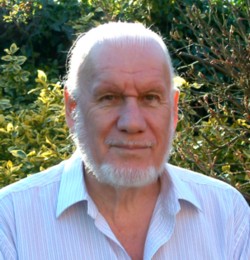 |
Werner
erzählte mir später, dass ich der letzte RAF-Mann war, der
die (ehemaligen RAF) Gebäude vor dem Abriss sah.
Mit der guten alten Linie 5 fuhren wir von Ossendorf zurück in die Stadt. |
||||||||||||||||||||||
|
||||||||||||||||||||||||
 |
||||||||||||||||||||||||
Halle
4 F.R.U. Vehicle Repair 13. Januar 2008 when it is wrecked
|
||||||||||||||||||||||||
| You will find more pictures of old RAF buildings in the : "RAF-station Butzweilerhof last pictures" chapter. | Weitere Bilder der alten RAF-Gebäude finden Sie im Kapitel: "RAF-station Butzweilerhof last pictures" | |||||||||||||||||||||||